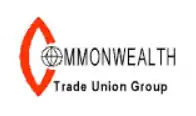Commonwealth Trade Union Group
The Commonwealth Trade Union Group (abbreviated CTUG) is a London-based international alliance of trade union in the Commonwealth countries. It was previously known as the Commonwealth Trade Union Council (abbreviated CTUC).[1] As of 2007, the combined membership of CTUG affiliates reached 30 million.[2]

The decision to set up the CTUC was taken at the Commonwealth Trade Union Conference, held in June 1979. In November 1979 a number of trade unions of the Commonwealth agreed to a set of proposals issued by a special working party launched at the June 1979 conference. The official founding of CTUC took place in March 1980, with Canadian Labour Congress president Dennis McDermott as the CTUC chairman and Carl Wright as the director of the organization.[3] The stated goal of the CTUC was to guarantee that 'trade union views are taken into account by Commonwealth government and institutions'.[4] As of 1982 the CTUC Steering Committee included McDermott (Chairman), Gopeshwar(India), W. Richardson (Australia), F. F. Walcott (Barbados), Wright, N. K. Bhatt (India), J. Harker (Canada), L. Osunde (Nigeria), E. Mashasi (Tanzania), K. Mehta (India) and R. L. Thaker (India).[5] Shirley Carr also served as chair of CTUC.[6]
CTUC took part in founding the Commonwealth Human Rights Initiative in 1987.[7] In 1988 Patrick Quinn became director of CTUC, in 1994 Arthur Johnstone was named new director of CTUC.[3]
CTUC was reconstructed as CTUG on 31 December 2004. The group works in cooperation with the International Trade Union Confederation.[1][2] CTUG is accredited at the Commonwealth Foundation (through ITUC).[2]
References
- James C. Docherty; Sjaak van der Velden; Jacobus Hermanus Antonius van der Velden (14 June 2012). Historical Dictionary of Organized Labor. Scarecrow Press. p. 70. ISBN 978-0-8108-6196-1.
- International Trade Union Confederation. CTUG Fact Sheet
- Australian National University. Commonwealth Trade Union Council
- Roger Blanpain; Jim Baker (1 January 2004). Comparative Labour Law and Industrial Relations in Industrialized Market Economies. Kluwer Law International. p. 92. ISBN 978-90-411-2289-6.
- Commonwealth, Vol. 25-27. Royal Commonwealth Society. 1982. p. 234.
- Elizabeth Sleeman (2001). The International Who's Who of Women 2002. Psychology Press. p. 91. ISBN 978-1-85743-122-3.
- Jude Howell (30 October 2012). Global Matters for Non-Governmental Public Action. Palgrave Macmillan. p. 97. ISBN 978-0-230-29035-8.